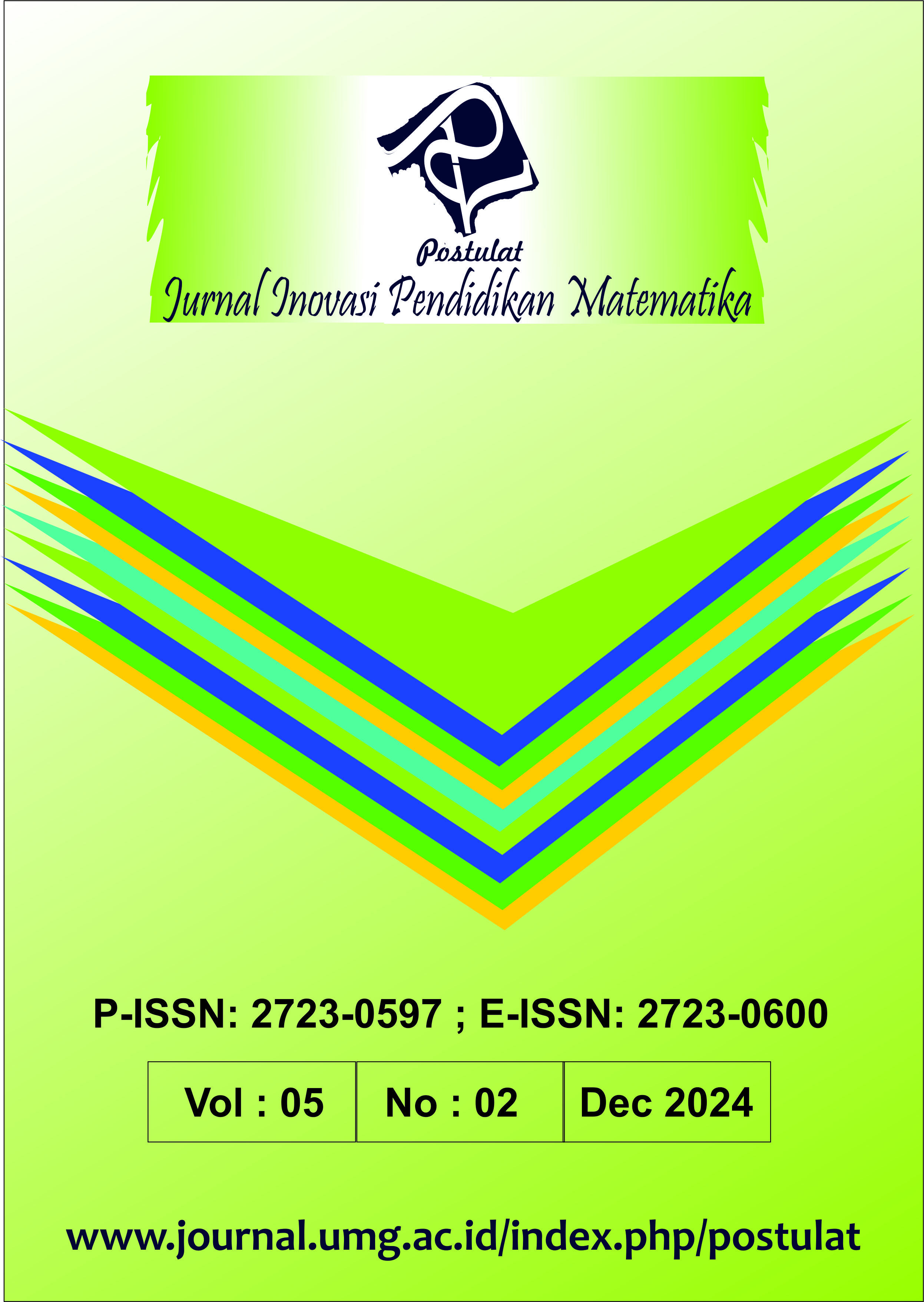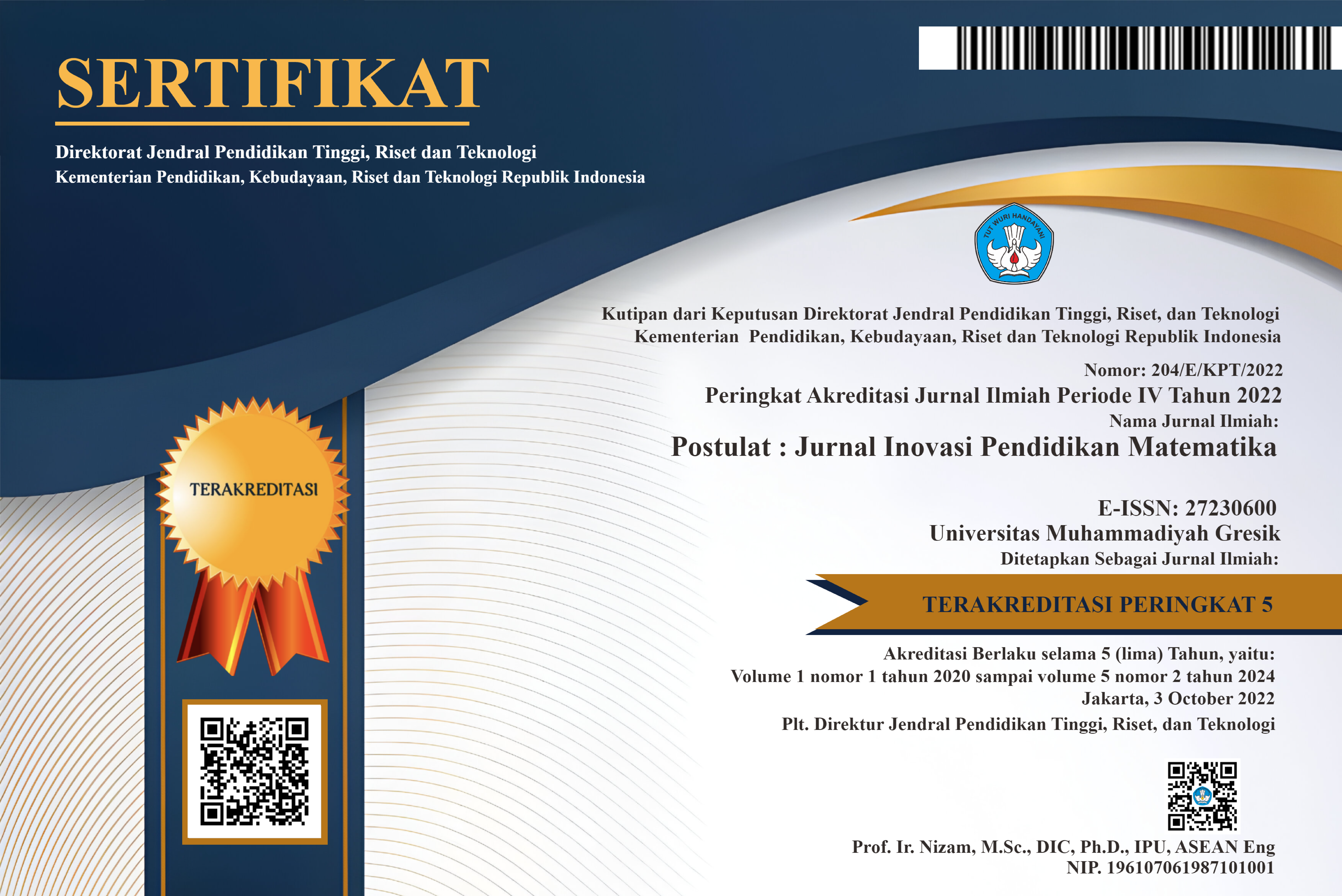Pengaruh Kecemasan Matematika terhadap Prestasi Belajar Matematika Siswa SMP Negeri 2 Jogoroto
DOI:
https://doi.org/10.30587/postulat.v5i2.9092Keywords:
Mathematics Anxiety, Learning AchievementAbstract
Students' mathematics learning achievement is influenced by several factors, one of which is anxiety. The purpose of this study was to determine whether or not there is an effect of mathematics anxiety on students' mathematics learning achievement. This study is a correlational study. The population in this study were all students of class VIII of SMP Negeri 2 Jogoroto in the 2021/2022 academic year consisting of 160 students. The sampling technique in this study used a random sampling technique, namely a random sampling technique. The number of samples in the study was 40 students. Data collection used two methods, namely the questionnaire method and the documentation method. The research instrument used a questionnaire sheet and a documentation sheet. The validity of the instrument used expert validity. Data analysis used simple linear regression analysis. The results of the data analysis obtained a Sig value of 0.000 <0.05 so that H_0 was rejected, meaning that there is an effect of mathematics anxiety on students' mathematics learning achievement at SMP Negeri 2 Jogoroto with a regression equation Y = 94.614-0.739, which means that for every 1 increase in the score obtained in mathematics anxiety, learning achievement will decrease by 0.739. The magnitude of the correlation is -0.822 with a Sig value of 0.000 <0.05 so that H_0 is rejected, meaning that there is a significant relationship between mathematics anxiety and students' mathematics learning achievement at SMP Negeri 2 Jogoroto. With a Determination Coefficient value of 0.676, it shows that there is an influence of mathematics anxiety of 67.6% and 32.4% is influenced by other factors that are not studied.
References
Anita, I. W. (2014). Pengaruh Kecemasan Matematika (Mathematics Anxiety) Terhadap Kemampuan Koneksi Matematis Siswa SMP. Infinity Journal, 3(1), 125-132
Arikunto, S. (2014). Prosedur Penelitian: Suatu Pendekatan Praktik. Jakarta : Rineka Cipta
Artama, E. N. N., Amin, S. M., & Siswono, T. Y. E. (2021). Pengaruh Kecemasan Matematika Terhadap Hasil Belajar Matematika Siswa. Jurnal Penelitian Pendidikan Matematika Dan Sains, 4(1), 34. https://doi.org/10.26740/jppms.v4n1.p34-40
Maf’ulah, S. (2022). Reversible Thinking of Fifth Graders : Focus on Linier Equations. Jurnal Ilmiah Sekolah Dasar (JISD), 6(1), 165–175. https://doi.org/10.23887/jisd.v6i1.44017
Maf’ulah, S., & Juniati, D. (2020). The effect of learning with reversible problem-solving approach on prospective-math-teacher students’ reversible thinking. International Journal of Instruction, 13(2), 329–342. https://doi.org/10.29333/iji.2020.13223a
Perbangsa, W.W.A dan Haq, C.N. (2014). Perbedaan Prestasi Belajar Matematika Siswa Antara yang Mendapatkan Model Pembelajaran Guided Note Taking dengan Team Accelerated Instruction. Jurnal Pendidikan Matematika STKIP Garut, (Online), (https://media.neliti.com/media/publications/226704-perbedaan-prestasi-belajar-matematika-si-4f4e1672.pdf), diunduh pada 28 Juni 2022
Qausarina, H. (2014). Pengaruh Kecemasan Matematika (Math Anxiaety) Terhadap Hasil Belajar Matematika Siswa Kelas X SMA Negeri Banda Aceh, Skripsi Fakultas Tarbiyah dan Keguruan Universitas Islam Negeri Ar-Raniry Darussalam Banda Aceh.
Rozak, A.,& Hidayati, W.S. (2019). Pengolahan Data dengan SPSS. Yogyakarta: Erhaka Utama.
Putri, A. E., Aurellia, S., Wulandari, S., Devita Rani, B., Anugerah Gusti, A., Affani Rahma, V., & Maf’ulah, S. (2024). Pi: Mathematics Education Journal Analisis Pemahaman Konseptual Siswa SMP Materi Himpunan. Pi: Mathematics Education Journal, 7(1), 1–11. https://doi.org/10.21067/pmej.v7i1.9484
Putri, H. P., Maf'ulah, S., & Hartiningrum, E. S. N. (2023). Analisis Kemampuan Siswa SDN Banjardowo 1 Jombang dalam Memecahkan Masalah Pecahan konsep , keterampilan , dan proses matematika untuk memecahkan masalah matematika. Postulat: Jurnal Inovasi Pendidikan Matematika, 4(2), 286–296.
Nuraeni, R. & Munandar, D. R. (2023). Analisis Kecemasan Matematis Siswa SMP Terhadap Hasil Belajar Matematika. Didactical Mathematics, 5(2), 361–368. https://doi.org/10.31949/dm.v5i2.5862
Saragih, A., Sibagariang, S. A., & Simatupang, L. F. (2022). Hubungan Antara Kecemasan Belajar dan Perhatian Orangtua terhadap Hasil Belajar Siswa Kelas VIII. Edukatif : Jurnal Ilmu Pendidikan, 4(5), 7068–7075. https://doi.org/10.31004/edukatif.v4i5.3969
Harahap, S.A.A. & Rahman, V. R. (2023). Kecemasan Matematika Siswa dalam Pembelajaran. Griya Journal of Mathematics Education and Application, 3(1), 135–140. https://doi.org/10.29303/griya.v3i1.274
Susanto, A. (2013). Teori Belajar dan Pembelajaran. Jakarta : Kencana.
Wulandari, M. R., & Lestari, K. E. (2022). Analisis dampak kecemasan matematis siswa terhadap kemampuan sintesis matematika. Biormatika: Jurnal Ilmiah Fakultas Keguruan Dan Ilmu Pendidikan, 8(1), 74–83. https://doi.org/10.35569/biormatika.v8i1.1222
Yuliasih, D. (2014). Pengaruh Kecemasan dan Motivasi Belajar Terhadap Hasil Belajar Matematika Siswa Kelas VII SMP Negeri 6 Kota Mojokerto. Skripsi STKIP PGRI Jombang: tidak diterbitkan.












